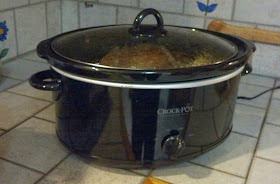A delicious smelling beef roast simmering in the crockpot with potatoes, onions, and carrots
We have grass-pastured raised Black Angus beef for sale. These two steers were gently raised on Our Tiny Farm in Etowah, NC. They lived on our pasture eating the fresh grass growing there. In the winter we also fed them locally grown hay, carefully selected to not contain persistent herbicides. The meat was aged for several weeks, butchered, vacuumed packed, and frozen at a USDA inspected facility in Forest City, NC. The beef is boxed in quarters and being held in deep freezers ready for you to purchase at $7.25 per pound plus tax, packaged weight. If you are interested in buying or want to learn more, use the contact form on the right sidebar. We only raise two steers at a time, so the beef sells quickly.
These are the two Black Angus steers in our pasture in November
Upon customer request, we harvested these steers at a smaller size then the ones we raised previously. So each quarter weighs approximately 85-88 pounds. That is finished, packaged weight; just like you would buy meat in a butcher shop or supermarket. (Many farmers sell their beef as "hanging weight" which includes the bone and excess fat. The way we sell it, you know exactly how much meat you are getting). An average quarter contains approximately 3 sirloin steaks, 2 ribeye steaks, 2 round steaks, 7 t-bone steaks, 2 cube steaks, 1 arm roast, 2 sirloin tip roasts, 3 chuck roasts, 11 one-pound packages of stew beef, 3 packages of ribs, and 34 one-pound packages of ground beef (this will, of course, vary some from quarter to quarter).
Our daughter reaching out to pet one of the steers
One of our customers just told us how much her family enjoyed the first roast they cooked. If 87 pounds of beef sounds like a lot, you can always split it with another family, but it also holds in a freezer for a very long time. We held a few steaks and roasts from the steers we harvested in fall 2011 to see how long they retain their quality. We keep them in a standard chest freezer. We recently had several of the 2011 t-bone steaks and they were just as tasty and fresh tasting as they were in the beginning. The vacuum packaging is what does it. We also like the vacuum packaging because you can quickly thaw ground beef, stew beef, ribs, and steaks by putting them in a sink full of water for 20 to 30 minutes. It is not recommended to thaw pasture raised or grass-fed beef in the microwave.
Why don't we call our beef "grass-fed"? The term "grass-fed" is actually a federal designation for beef that has ONLY been fed fresh grass and hay. Fresh grass and locally grown hay make up more than 99% of our steers' diet, but we do give them a cupful of sweet feed (grain and molasses) frequently to keep them "trained to a bucket". That means they will come running to us whenever they see us with the buckets or hear us shake the buckets with feed in them. We do that so that if they ever get out of their pasture, we can entice them to come home. It also allows us to give them some minerals once in a while, and if they were ever to get sick, we could give them medicine. These two steers were never ill, so they never did receive any antibiotics. But, because we give them that tiny bit of sweet feed, we cannot legally call our cattle "grass-fed". And of course, our cattle never received any hormones. We have not fertilized or sprayed herbicide on the pasture. We use fly predators as the basis for our fly control program. We are NC licensed meat handlers and are certified Appalachian Grown by ASAP.




No comments:
Post a Comment